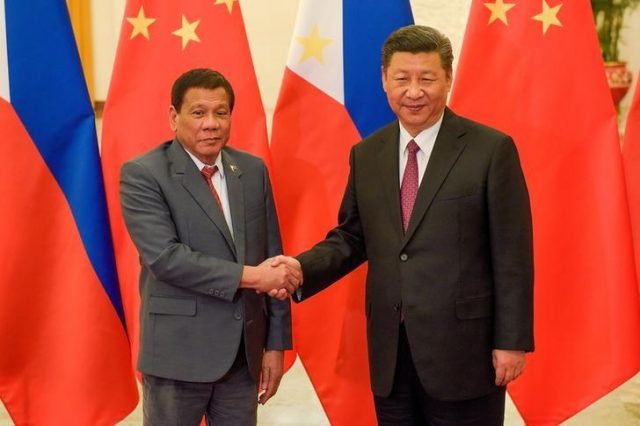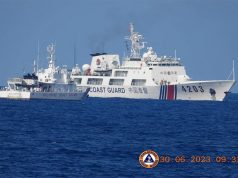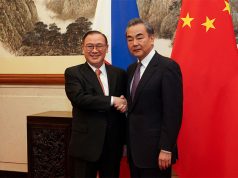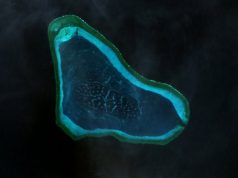
MANILA – Any deal between the Philippines and a Chinese firm to jointly explore for gas in the Reed Bank of the South China Sea will be illegal unless China recognizes the southeast Asian nation’s sovereign rights there, a Philippine judge said on Monday.
Manila has identified two areas in the crowded waterway suitable for joint exploration and the two countries seek a way to tackle the diplomatic and legal headache of jointly exploring in the waters, but without addressing the issue of sovereignty.
The Reed Bank is claimed by both sides, but international law says it falls within the Exclusive Economic Zone (EEZ) of the Philippines. China says it falls within the so-called nine-dash line on maps recording its historic rights in the area.
Antonio T. Carpio, the acting top judge of the Supreme Court, said it was legal for the Philippines’ energy ministry to talk to state-owned China National Offshore Oil Corp (CNOOC) as a possible sub-contractor.
“There’s no problem as long as CNOOC will recognize that that is our exclusive economic zone,” he told news channel ANC in an interview. “But that is the problem, because CNOOC will not recognize (Philippine jurisdiction).”
Mr. Carpio was speaking as an expert on international law and staunch advocate for the Philippines to assert its maritime sovereignty claims.
He was among the lawyers involved in the Philippines’ legal challenge against China, which Manila brought to the Permanent Court of Arbitration in the Hague in 2013.
The tribunal, in its 2016 ruling, invalidated China’s nine-dash line, making clear that the Reed Bank fell within the Philippines’ EEZ, and that Manila had sovereign rights to resources there.
China is a signatory to the United Nations Convention on the Law of the Sea (UNCLOS) but it does not recognize the Hague court ruling.
“The stumbling block has always been the insistence of China that we recognize their sovereign rights,” Mr. Carpio said.
“We cannot do that anymore because there’s already a ruling. And the (Philippine) constitution says the state shall protect its marine wealth in its exclusive economic zone, it’s very specific.”
The Reed Bank was the site of exploration by the Philippines’ PXP Energy Corp to evaluate the block’s gas reserves, until the energy ministry suspended activities there in late 2014 because of the arbitration case.
PXP has had talks with CNOOC for possible joint exploration and development, but the arbitration halted negotiations.
Mr. Carpio said who should collect taxes was also an issue between the two companies.
NOT THE FIRST
For his part, Presidential Spokesperson Herminio Harry L. Roque, Jr. said the Philippines could take the Vietnam-China treaty as a model for joint exploration.
“If ever we enter into joint exploration agreements, it wouldn*t be the first in the world. We could look into Vietnam-China treaty as a model,” he said in his press briefing Monday, referring to the agreement between CNOOC Group and Petro Vietnam on joint exploration in the agreed offshore area in the Gulf of Tonkin, a body of water located off the coast of northern Vietnam and southern China.
Vietnam, like the Philippines, is one of the claimants to the disputed region of South China Sea currently being militarized by China.
Mr. Roque added: “There’s one between Iceland and Norway for oil and gas in the RERI (Regional Economic Research Institute) region, where CNOOC is also involved, including the national oil companies of both Iceland and Norway.
There is a joint exploration agreement entered into by Kenya and this is again CNOOC and Kenyan government. Even New Zealand has a joint exploration with the Chinese Oil Company CNOOC.”
The spokesman argued that all these joint exploration agreements “mean that if ever [the Philippines] enters into joint exploration and development agreements, it wouldn’t be the first in the world.”
Explaining joint explorations, Mr. Roque also cited the 2004 Supreme Court ruling on La Bugal-B*laan Tribal Association vs. then Environment secretary Victor O. Ramos RAMOS et al., which is about the Philippine Mining Act, whether or not it is unconstitutional “for allowing fully foreign-owned corporations to exploit the country’s mineral resources.”
The SC resolution on the case states that: “All mineral resources are owned by the State. Their exploration, development and utilization (EDU) must always be subject to the full control and supervision of the State. More specifically, given the inadequacy of Filipino capital and technology in large-scale EDU activities, the State may secure the help of foreign companies in all relevant matters 〞 especially financial and technical assistance 〞 provided that, at all times, the State maintains its right of full control.”
However, Mr. Carpio, in his interview with ANC, said, “The La Bugal case that Harry Roque referred to refers to extraction of minerals on land territory, mining companies extracting on land territory. We are talking here on extraction of oil and gas in the exclusive economic zone. In the exclusive economic zone, the constitution has a specific requirement, and it says the state shall reserve the use and enjoyment of the nation’s wealth in the exclusive economic zone for Filipino’s only.”
He added: “That particular provision (pertaining to the EEZ) does not apply to extraction of minerals on land. It applies only to exclusive economic zone, and we have not yet decided any case on that.〞– With Arjay L. Balinbin, BusinessWorld









